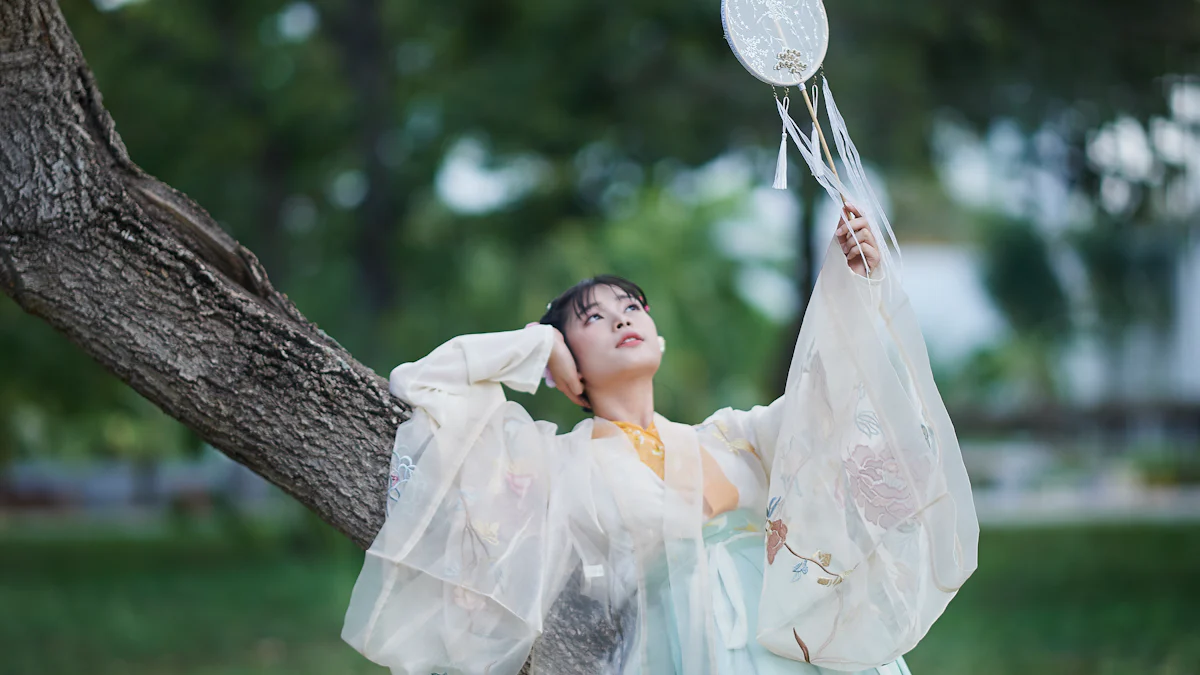 In the realm of Chinese traditions, white Hanfu holds a significant place. Its pristine hue symbolizes purity and simplicity, embodying timeless elegance. Worn by both men and women, this attire plays a crucial role in various ceremonies and events. This blog aims to delve into the deep-rooted importance of white Hanfu in Chinese culture, exploring its symbolic meanings and cultural significance.
In the realm of Chinese traditions, white Hanfu holds a significant place. Its pristine hue symbolizes purity and simplicity, embodying timeless elegance. Worn by both men and women, this attire plays a crucial role in various ceremonies and events. This blog aims to delve into the deep-rooted importance of white Hanfu in Chinese culture, exploring its symbolic meanings and cultural significance.
Historical Context
In ancient China, the Origins of Hanfu can be traced back to the rich cultural heritage of various dynasties. The magnificence of the Han Dynasty, the elegance of the Jin Dynasty, the openness of the Tang Dynasty, and the dignity of the Song Dynasty all influenced the evolution of this traditional attire. Over time, Hanfu has undergone significant transformations while retaining its essence and historical significance.
Moving into Modern Times, there has been a remarkable revival of interest in Hanfu. Characters adorned in these exquisite costumes in period dramas have sparked a renewed appreciation for this centuries-old outfit. The quest to preserve tradition and promote national identity has further propelled the resurgence of Hanfu fashion. Notably, China Huafu Day now commemorates this resurgence, celebrating the enduring legacy and cultural importance of Hanfu.
The history and revival of ancient Chinese Hanfu continue to inspire contemporary designers in creating new garments that pay homage to tradition while embracing modern aesthetics. The fusion of classical elements with innovative designs reflects a harmonious blend of past and present influences, ensuring that white Hanfu remains a symbol of cultural pride and artistic expression.
Cultural Symbolism
In the realm of Chinese traditions, white Hanfu embodies profound cultural symbolism, representing values deeply rooted in ancient beliefs. The symbolic significance of white Hanfu extends beyond its aesthetic appeal, conveying powerful messages of purity and simplicity.
Symbol of Purity
White as purity: In traditional Chinese culture, white Hanfu serves as a visual representation of purity and innocence. The pristine white hue symbolizes a fresh start and new beginnings, reflecting the essence of untainted beauty. Adorned in white Hanfu, individuals exude an aura of immaculate grace, embodying the purity of their intentions and actions.
Simplicity in design: The elegant design of white Hanfu further accentuates its symbolic purity. With clean lines and minimalistic embellishments, this attire exudes a sense of understated sophistication. The simplicity of the garment highlights the wearer’s inner virtues and noble character, emphasizing the importance of humility and sincerity in one’s demeanor.
Symbol of Mourning
Mourning traditions: In Chinese funerary rituals, white Hanfu holds a solemn significance as the traditional color of mourning. Worn by grieving individuals to honor departed loved ones, white garments symbolize respect for the deceased and convey heartfelt condolences. This somber attire distinguishes mourners from others, signifying their reverence for the departed souls.
Filial piety: The act of wearing white Hanfu during mourning ceremonies also reflects the enduring value of filial piety in Chinese culture. By donning this symbolic attire, individuals demonstrate their deep respect for family ties and ancestral heritage. The gesture of honoring ancestors through traditional customs underscores the importance of familial bonds and upholding moral obligations.
The cultural symbolism embedded within white Hanfu transcends mere fashion statements, carrying profound meanings that resonate with centuries-old traditions and beliefs.
Usage in Ceremonies
Weddings
In traditional Chinese weddings, white Hanfu plays a pivotal role in symbolizing purity and new beginnings. Adorned in this pristine attire, the bride and groom embody the essence of innocence and hope as they embark on their marital journey. The symbolic significance of white Hanfu extends beyond its aesthetic charm, reflecting the couple’s commitment to a life filled with harmony and prosperity.
Symbolism in weddings
- Purity and Innocence: White Hanfu represents the purity of love and the innocence of newly formed bonds.
- New Beginnings: The pristine white hue symbolizes a fresh start for the couple as they unite in marriage.
- Harmony and Prosperity: Wearing white Hanfu signifies the couple’s desire for a harmonious and prosperous life together.
White Hanfu in modern weddings
- Cultural Fusion: Modern couples incorporate elements of traditional Chinese culture by donning white Hanfu alongside contemporary wedding attire.
- Symbolic Gestures: The choice of white Hanfu reflects a deep appreciation for cultural heritage and a nod to timeless traditions.
Festivals and Rituals
During traditional Chinese festivals and rituals, white Hanfu holds special significance as a symbol of peace and harmony. Whether celebrating Lunar New Year or honoring ancestors during Qingming Festival, wearing white garments evokes a sense of reverence for tradition and unity within the community.
Traditional festivals
- Embracing Tradition: Participants don white Hanfu to pay homage to age-old customs and celebrate cultural identity.
- Symbolic Representation: The elegant attire symbolizes peace, unity, and prosperity during festive gatherings.
Ritual significance
- Ancestral Reverence: In ancestral rites, wearing white Hanfu signifies respect for one’s lineage and honors the wisdom passed down through generations.
- Communal Harmony: By dressing in white garments during rituals, individuals foster a sense of unity and solidarity within their community.
- Reflecting on the symbolic essence of white Hanfu, it stands as a beacon of purity and tradition in Chinese culture.
- Its enduring relevance transcends time, embodying the values of peace and harmony.
- The profound cultural importance of white Hanfu underscores its timeless significance in honoring heritage and fostering unity within communities.






